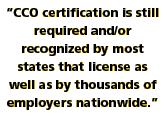November 2014—OSHA recently announced it was postponing its requirement for crane operators to be certified until 2017. We asked NCCCO President Thom Sicklesteel what this means for employers, as well as for those already holding certifications.
 NCCCO: What exactly has OSHA done—and why?
NCCCO: What exactly has OSHA done—and why?
Sicklesteel: OSHA has officially delayed, by three years, the implementation date of the requirement for crane operators to be certified. OSHA has done this to give it time to correct two issues the industry has brought to light with the rule.
NCCCO: What issues are those?
Sicklesteel: The issues that have caused such an outcry from the industry are: (1) the requirement to certify “by capacity,” and (2) that certified operators are automatically deemed “qualified.” It is expected that OSHA will work towards issuing a proposed rule that would change both of these requirements.
NCCCO: Does this mean that CCO certifications are still valid?
 Sicklesteel: Absolutely. CCO certification, which was formally recognized by federal OSHA as long ago as 1999, is as valid today as it has ever been. In fact, CCO certification is still required and/or recognized by most states (having their own requirements that are unaffected by the federal rule) as well as by thousands of employers nationwide. NCCCO is confident that the necessary changes to the rule will be made, and that they will reflect the industry’s consensus on what operator certification is and, just as importantly, what it is not.
Sicklesteel: Absolutely. CCO certification, which was formally recognized by federal OSHA as long ago as 1999, is as valid today as it has ever been. In fact, CCO certification is still required and/or recognized by most states (having their own requirements that are unaffected by the federal rule) as well as by thousands of employers nationwide. NCCCO is confident that the necessary changes to the rule will be made, and that they will reflect the industry’s consensus on what operator certification is and, just as importantly, what it is not.
NCCCO: What if capacity isn’t listed on certificants’ CCO certification cards?
Sicklesteel: It doesn’t have to be, since that requirement never took effect. And since certification “by capacity” will go away in the rule re-write, it won’t be necessary for certification.
NCCCO: Even though the federal requirement won’t go into effect until 2017, why should operators certify now?
Sicklesteel: Certification, when done correctly, has been shown to reduce accidents, save lives, and reduce injuries. In California, for example, crane-related fatalities dropped by a remarkable 80% after mandatory certification was introduced. Since 1996, NCCCO has administered over 850,000 nationally accredited written and practical examinations, and issued more than 240,000 certifications to over 100,000 people. All of this was done without a federal requirement and in the certain knowledge of the clear safety and productivity benefits of certification. And, it’s just as important to remember that employers are still responsible for ensuring their operators are trained and competent to operate cranes.
NCCCO: Should CCO-certified operators recertify in the usual manner?
Sicklesteel: Absolutely. OSHA’s decision to reopen the rule doesn’t affect existing certifications. Certificants should make sure their certification does not lapse because they would have to start over and take both written and practical exams to certify again.
For more information, view NCCCO’s Top 10 Frequently Asked Questions on OSHA’s Delay of Its Crane Operator Certification Requirements or visit NCCCO's OSHA Rule Reopening Resource Center.